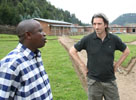
On Secretary Clinton’s first day of meetings in Kenya, Enough’s John Prendergast will speak with MSNBC’s Andrea Mitchell to discuss what the Secretary of State’s first trip to Africa should accomplish. Tune in to MSNBC at 1p.m. ET for the broadcast from Nairobi, where Clinton is attending the Africa Growth and Opportunity Act conference. For a preview of what Prendergast thinks the secretary’s priorities should be, here’s a cross post of his piece that appeared on Huffington Post yesterday:
The New Blood Diamonds
Being held at gunpoint by 30 drunk and angry militia in the middle of the night on a deserted road in one of the most dangerous war zones in the world was not our plan when we started out the day. But my traveling companions and I were digging into the links between the illicit mining of Congo’s “conflict minerals’’ and a deadly war, and we didn’t expect a walk in the park. We had visited a gold mine contested by some particularly vengeful armed groups, and this militia had lost out in controlling the mine and wasn’t happy about the result. After hours of negotiations, guns poked into ribs, and death threats, we emerged relatively unscathed and $1,000 poorer. Congolese civilians, however, are rarely so fortunate.
Secretary of State Hillary Clinton’s visit to the Democratic Republic of the Congo next week provides the opportunity to demonstrate the importance of ending the world’s most pronounced use of rape as a weapon. She will hopefully signal a greater investment in peacemaking and civilian protection by the United States. But private-sector action is equally needed. Much of the violence in eastern Congo today stems from the struggle for control of Congo’s valuable mines which produce some of the minerals essential to our most common electronics devices. Therefore, a crucial ingredient for ending the conflict will be the success of a nascent consumer campaign in which American and European buyers of cell phones, laptops, and iPods begin to demand conflict-free electronics products that don’t source their essential materials from mines that produce deadly conflict.
This year has seen a major spike in human rights violations in Congo, in particular violence against women and girls, the abduction and forced conscription of children as soldiers or sex slaves, the burning of houses or entire villages, and the systematic looting of the homes and livelihoods of civilians. The humanitarian crisis has deepened dramatically with half a million newly displaced since the beginning of 2009. This catastrophic cycle of violence is fueled by a scramble for one of the world’s richest non-petroleum resource bases, overlaid by a Congolese government offensive backed by the United Nations – a destructive campaign for which Secretary Clinton should urge immediate suspension.
We interviewed a number of women who had survived horrific sexual attacks during this campaign. Systematic rape has evolved over the last dozen years of war as a tool of social control or collective punishment against civilian populations deemed supportive of opposing armed groups. All the armed groups are now using rape as a component of their military operations, to terrorize, humiliate, demoralize and subjugate targeted communities.
Ironically, the international community spends well in excess of $2 billion a year treating the symptoms of the Congolese crisis (with peacekeeping and emergency assistance), but roughly one-tenth of 1 percent of what we spend on aid and peacekeepers is spent on addressing the main fuel for its continuation: conflict minerals.
Most diplomacy seems not to recognize two dark and little-acknowledged realities: that the Congolese government actually promotes insecurity to allow its top officials to enrich themselves in the illegal smuggling of Congo’s natural resources, and neighboring Rwanda’s and Uganda’s economic growth is in part fueled by their involvement in the smuggling and violence. One mineral merchant told me he would be killed if he went on camera to talk about these issues.
Because the multinational corporations hide the direct connections between their demand for Congo’s natural resources and the destruction of human life in that country, especially women and girls, we don’t realize that the solution lies in part with us as electronics consumers.
The “blood diamonds’’ case provides a crucial precedent. Until there was general consumer uproar about the effect Western demand for a precious commodity was having on the people of Sierra Leone, Liberia, and Angola, those conflicts continued to burn, with Western consumers providing all the fuel necessary to keep the wars going indefinitely. Electronics companies should pressure their suppliers to ensure that these minerals don’t originate in mines that fuel the war and corruption, and allow independent audits to prove it.
Mining could be the engine of Congo’s peaceful development. Such a result will come more quickly if companies, governments, and other stakeholders can agree on a system to trace, audit, and certify conflict-free minerals that go in our electronics products and jewelry. This would change the incentive structure away from violence and illegality toward security and rule of law in Congo. Only when it becomes more profitable to exploit the minerals legally will there be sufficient incentive for peace in Congo.

